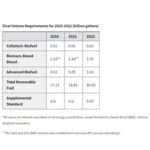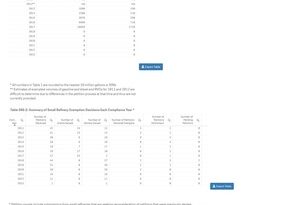EPA denies 36 SREs, does not remedy demand destruction
Energy Disrupter
ADVERTISEMENT
The U.S. EPA on April 7 announced it is denying the 36 small refinery exemption (SRE) petitions for compliance year 2018 that were remanded by the U.S. Court of Appeals for the D.C. Circuit. The 31 small refineries whose previously approved SREs were overturned, however, will not need to purchase or redeem additional renewable identification numbers (RINs) to comply with Renewable Fuel Standard renewable volume obligations (RVOs) for 2018. The agency is instead allowing those 31 small refineries to use an “alternative compliance approach.” The EPA said it is still considering SRE petitions filed by other refineries for compliance years 2016-2021.
According to the EPA, the denial of the 36 remanded SREs apply the agency’s new interpretation of the Clean Air Act SRE provisions, consistent with a U.S. Court of Appeals for the Tenth Circuit holding in Renewable Fuels Association et al. v. EPA.
“The Tenth Circuit held that SREs may only be granted when a small refinery’s hardship is caused by compliance with the RFS program,” said the EPA in a statement. “Today’s decision changes and remedies EPA’s prior approach to SRE decisions, under which EPA found basis to grant hardship exemptions where no hardship from RFS compliance existed. After reviewing more than a decade of RFS market data, public comments on a proposal EPA issued in December 2021, and confidential information submitted by petitioners, EPA concluded that none of the 36 2018 SRE petitions demonstrated hardship caused by compliance with the RFS program.”
The EPA published a notice explaining its decision to provide 31 small refineries with an alternative approach to demonstrating compliance with their RFS renewable volume obligations (RVOs) for compliance year 2018.
“Each of the specified small refineries had previously been granted an SRE for the 2018 compliance year; however, each of their petitions again came before the agency as the result of court remand,” the EPA said in the notice. “The compliance action is necessary because EPA has determined there are extenuating circumstances that warrant an alternative compliance demonstration approach that the specified small refineries may use to meet their 2018 obligations without retiring any additional RINs.”
The alternative approach allows the 31 small refineries to resubmit their 2018 RFS annual compliance reports with zero deficit carryforward and no additional RIN retirements, according to the EPA. The agency said it is allowing this approach because it has determined “that there are extenuating circumstances that would present virtually insurmountable obstacles to these 31 small refineries and significant concerns relating to the RFS program as a whole were these small refineries required to meet their newly created 2018 obligations under the existing compliance scheme.”
“While the need for the compliance action flows from the SRE denial, and there would be no need for the compliance action without the SRE denial, each action is separate and independent from the other,” the agency continued. “The SRE denial, consistent with the statute and applicable case law, adjudicates SRE petitions; this compliance action determines how the identified 31 small refineries may demonstrate compliance with their 2018 obligations. These actions utilize differing authorities and operate independently. Thus, it is our intent that the action taken in this compliance action be severable from the decision to deny SRE petitions in the SRE denial.”
Growth Energy, Renewable Fuels Association, National Corn Growers Association, Clean Fuels Alliance America, American Coalition for Ethanol, and National Farmers Union released a joint statement applauding the EPA’s action to deny the 36 SREs, but decrying the agency’s decision to allow 31 small refineries to comply with their 2018 RVOs without retiring any RINs.
“While today’s decision is an important step in reversing past abuse of refinery exemptions, the decision fails to remedy the economic harms the improperly granted 2018 SREs have already caused,” the groups said. “Low-carbon biofuels are the single best tool to deliver immediate relief at the pump, strengthen U.S. energy security, and protect the climate. EPA’s move to hold refiners accountable to the law is a welcome step toward getting the RFS back on track that, when applied to pending and future SRE petitions, would improve certainty in the marketplace, and lead to more blending of American-made biofuels. However, EPA’s readiness to excuse individual refineries from their obligations to comply with 2018 blending requirements comes at the expense of our biofuels producers, farmers, and American consumers.”
The Advanced Biofuels Business Council has spoken out in support of the EPA’s actions. “Four years ago, the Advanced Biofuels Association filed the first lawsuit challenging the Trump administration’s decision to grant SREs to anyone and everyone as a means to undermine the RFS program and lower the value of the RINs,” said Michael McAdams, president of the ABFA. “According to Scott Irwin, the Lawrence J. Norton Chair of Agricultural Marketing at the University of Illinois, the Trump Administration’s actions shifted 7 billion dollars from the pockets of biofuels producers to – for the first time – many large refiners.
“Today, we are delighted to see this nightmare finally put to bed by the Biden administration,” McAdams continued. “Given the global circumstances facing the liquid transportation fuels industry today, EPA’s decision thoughtfully considers all stakeholders in both the renewable and refining industries. Further, EPA’s denial protects the future of the RFS while ensuring American consumers don’t pay more at the pump as a result of this decision. This decision sends a strong signal of support to our members, concluding a years-long saga of legal abuse and creating regulatory certainty for our industry to make the low carbon fuels of the future.”
The Iowa Renewable Fuels Association said the EPA’s denial of 36 SREs sets a good precedent but criticized the agency’s plan for failing to undo past demand destruction. “The silver lining is that EPA has reaffirmed the 10th Circuit Court’s ruling that EPA lacked the authority to grant the exemptions in the first place. This rationale should be immediately applied to the other 60-plus RFS exemption requests that remain pending without delay,” said Monte Shaw, executive director of the IRFA.
“Yet we must also be honest that today’s action by EPA grants 31 RFS exemptions in all but name,” Shaw continued. “The unjustified use of RFS exemptions by the Trump EPA was called selling out our farmers by President Biden during the campaign, but now that demand destruction is allowed to stand. The bottom line is that today 31 refiners were released from their 2018 RFS obligations the same as had the exemptions been upheld.
“The EPA’s reasons for letting the refiners off the hook range from concerns about the RIN carryover balance to the 2018 compliance deadline having passed. However, nowhere in the RFS does Congress stipulate that EPA needs to care about the RIN carryover balance more than expanding the real-world use of biofuels,” he added. “And if reopening past compliance actions is such a concern, then it is hard to understand why the same EPA is proposing reopening the finalized 2020 RFS rule to lower RFS blend levels. Only in D.C. would the wiggle words in this rule be considered logic.
“We appreciate this precedent going forward, but nothing today drives demand and we’re still facing the loss of E15 markets throughout the country on June 1st. We implore President Biden to take action to drive biofuels demand and to allow consumers the option of lower-cost E15 during this summer of high fuel prices.”
Additional information is available on the EPA website.















